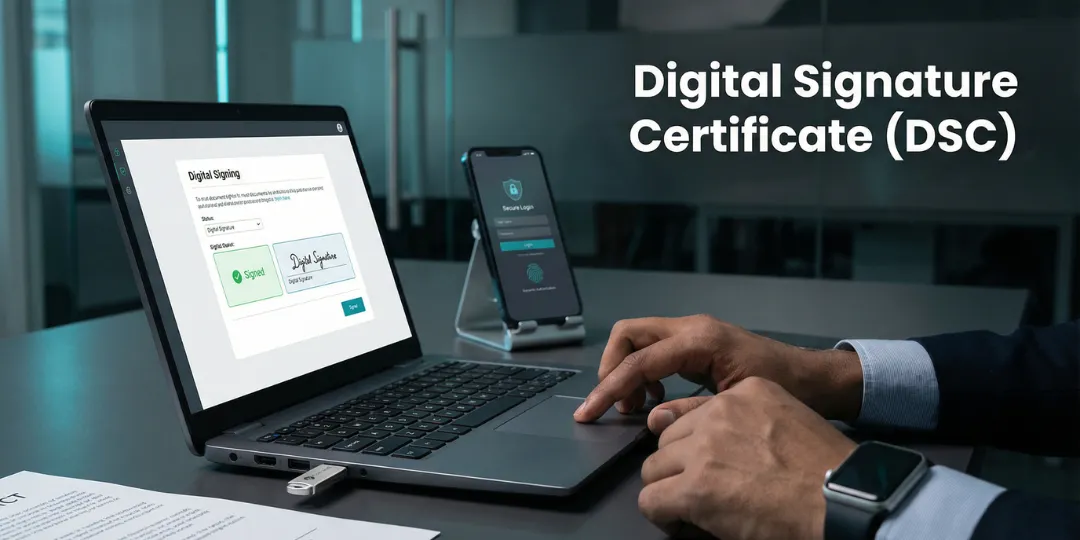
Process and Uses in Business
In today’s digital era, businesses and individuals are required to file documents, returns, and applications online with various government departments. To ensure the authenticity and security of such online transactions, the Digital Signature Certificate (DSC) plays a crucial role.
A DSC is the digital equivalent of a physical signature or a stamped seal. It is issued by licensed certifying authorities in India and is legally valid under the Information Technology Act, 2000. For businesses, DSCs are essential for compliance, secure communication, and building trust in digital transactions.
This guide explains what a DSC is, its types, the process of obtaining one, and how it is used in business compliance and operations.
What is a Digital Signature Certificate (DSC)?
A Digital Signature Certificate is an electronic form of a signature that proves the identity of an individual or organization in digital communications and online filings. It contains details such as:
- The holder’s name
- Public key and private key
- Certificate authority (CA) information
- Validity dates
- Unique serial number
It ensures authenticity, integrity, and non-repudiation of electronic documents and transactions.
Types of Digital Signature Certificates
DSCs are classified based on their level of security and usage.
Class 2 DSC (phased out for new applications)
- Used for filing income tax returns, GST returns, and company filings.
- Replaced by Class 3 DSC from January 2021.
Class 3 DSC
- The most secure and widely used DSC.
- Mandatory for e-tendering, e-procurement, and MCA (ROC) filings.
- Requires physical or video verification before issuance.
DGFT DSC
- Specifically issued for businesses engaged in import and export.
- Used for transactions on the Directorate General of Foreign Trade (DGFT) portal.
Uses of DSC in Business
Digital Signature Certificates have become indispensable for modern businesses due to increasing online compliance and communication.
1. COMPANY INCORPORATION AND ROC FILINGS:
Directors and professionals must use DSCs to sign incorporation forms like SPICe+, AGILE-PRO, and annual filings (AOC-4, MGT-7) on the MCA portal.
2. GST COMPLIANCE
DSC is required for GST registration, filing GST returns, and verifying amendments on the GST portal.
3. INCOME TAX E-FILING
Businesses and individuals can use DSCs to file income tax returns, particularly for companies and firms.
4. E-TENDERING AND E-PROCUREMENT
Government and private sector e-tenders mandate Class 3 DSC for authentication of bids.
5. IMPORT AND EXPORT COMPLIANCE
DGFT DSC is essential for obtaining licenses, filing applications, and other trade-related compliance.
6. BANKING AND FINANCIAL TRANSACTIONS
DSCs provide secure digital authentication for high-value financial transactions and loan applications.
7. LEGAL AND CONTRACTUAL DOCUMENTS
Many businesses use DSCs to digitally sign contracts, agreements, and NDAs, making them legally binding.
Process to Obtain a Digital Signature Certificate
Getting a DSC involves a simple but regulated process:
STEP 1: CHOOSE A CERTIFYING AUTHORITY (CA):
Select a licensed CA recognized by the Controller of Certifying Authorities (CCA), such as eMudhra, Sify, or NSDL.
STEP 2: SELECT TYPE AND VALIDITY:
- Choose Class 3 DSC (standard for business compliance).
- DSCs are generally valid for 1, 2, or 3 years.
STEP 3: SUBMIT APPLICATION FORM:
Fill out the DSC application form online or offline. Provide details like name, email, mobile number, PAN, and Aadhaar.
STEP 4: PROVIDE SUPPORTING DOCUMENTS:
Upload scanned copies of identity and address proof, such as:
- Aadhaar card, PAN card
- Passport, voter ID, or driving license
- Utility bills or bank statement for address verification
STEP 5: VERIFICATION PROCESS:
Verification is mandatory before issuing DSC:
- Aadhaar-based eKYC: OTP sent to registered mobile/email.
- Video Verification: Applicant records a live video for identity proof.
STEP 6: ISSUANCE OF DSC:
After successful verification, the DSC is issued on a secure USB token (cryptographic device). The token ensures safe storage of the certificate and private keys.
Validity and Renewal of DSC
- A DSC is valid for a maximum of two to three years.
- Renewal can be done through the same CA before expiry.
- Renewal requires submitting updated documents and verification.
Benefits of Using DSC in Business
- Legal recognition – DSCs are recognized under the IT Act, 2000, and hold the same legal value as physical signatures.
- Security – Provides encryption to protect documents and transactions.
- Time-saving – Enables quick online filings without physical presence.
- Credibility – Builds trust with clients, stakeholders, and government authorities.
- Mandatory for compliance – Essential for GST, ROC, income tax, and tender-related compliance.
Common Mistakes to Avoid in DSC Application
- Providing mismatched details between PAN, Aadhaar, and application form.
- Not renewing DSC before expiry, which can disrupt business compliance.
- Sharing the DSC USB token with unauthorized persons.
- Using a Class 2 DSC for processes that now mandate Class 3 DSC.
Conclusion
A Digital Signature Certificate (DSC) is no longer optional—it is an essential tool for businesses operating in India’s digital economy. From company incorporation to GST compliance, income tax filings, e-tendering, and import-export processes, DSC ensures secure, legally valid, and efficient online transactions.
Businesses must ensure they obtain a Class 3 DSC from a licensed authority, keep it renewed on time, and use it responsibly. By integrating DSCs into their compliance framework, companies not only meet legal obligations but also enhance credibility and security in all their digital interactions.

